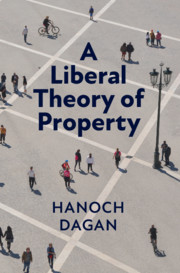Book contents
- A Liberal Theory of Property
- A Liberal Theory of Property
- Copyright page
- Dedication
- Contents
- Preface
- 1 Liberal Property
- 2 Some Basics
- 3 Autonomy and Private Authority
- 4 Property’s Structural Pluralism
- 5 Property’s Relational Justice
- 6 Making Property Law
- 7 Just Markets
- 8 Property Transitions
- 9 Afterword
- Notes
- Index
8 - Property Transitions
Published online by Cambridge University Press: 04 March 2021
- A Liberal Theory of Property
- A Liberal Theory of Property
- Copyright page
- Dedication
- Contents
- Preface
- 1 Liberal Property
- 2 Some Basics
- 3 Autonomy and Private Authority
- 4 Property’s Structural Pluralism
- 5 Property’s Relational Justice
- 6 Making Property Law
- 7 Just Markets
- 8 Property Transitions
- 9 Afterword
- Notes
- Index
Summary
Time plays a key role in this book. The last two chapters discussed two reasons why time matters to the life of property: over time, owners effect voluntary changes to property in order to carry out their life plans and the state imposes involuntary changes (from the individual owner’s perspective) in response to changing circumstances, shifting needs and wants, and revised public goals. For the state to function – and to remain justified on liberal principles – the government must have this ability to adjust ownership. However, state-initiated transitions to ownership – implemented through governments’ police and takings powers – are potentially devastating to the owners’ ability to be the authors of their own lives.
Keywords
- Type
- Chapter
- Information
- A Liberal Theory of Property , pp. 210 - 242Publisher: Cambridge University PressPrint publication year: 2021

